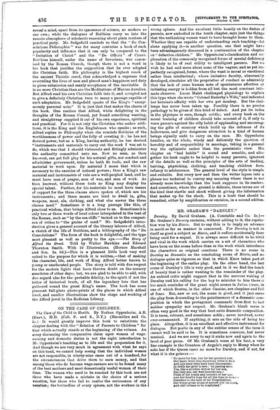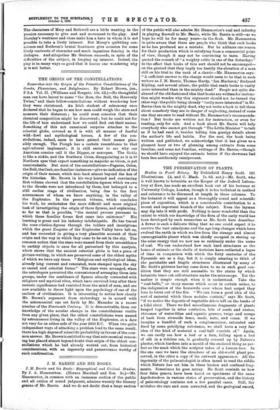MR. GRAHAM'S "DARNLEY."
Darnley. By David Graham. (A. Constable and Co. 5s.)— Mr. Graham's Darnley sustains, without adding to it, the reputa- tion won by his Rizzio. But to say this is to imply an advance in merit so far as manner is concerned. For .Darnley is not in itself as good a subject as Rizzio, and it suffers accidentally from being used for a sequel. It is always more difficult to be vivid and vital in the work which carries on a set of characters who have been on the scene before than in the work which introduces the characters as original creations There is no scene in Darnley as dramatic as the concluding scene of Rizzio, and no dialogue quite as vigorous as that in which Knox takes part at the beginning of the earlier play. On the other hand, the last scene of Darnley's life is very good, and in it we find the touch of beauty that is rather wanting to the remainder of the play. An unkind critic might suggest that in the nervous waking of Darnley and his calling for the boy to minister to him there is too much reminder of the great night scenes in Julius Cresar, in one of which Brutus, in the other Cassius, are sleepless and full of fears. But, new or not, the scene is good, and it just saves the play from descending to the pointlessness of a dramatic com- position in which the protagonist commands from first ta last neither sympathy nor respect. Mr. Graham's blank verse is often very good in the way that best suits dramatic composition. It is terse, reticent, and sometimes noble ; never involved, never over-ornamented. If anything, it errs on the side of being too plain. Altogether, it is an excellent and effective instrument for dialogue. But poetic in any of the subtler senses of the term it cannot well be said to be. It is sometimes sonorous, but never musical. And we are sorry to say it sinks now and again to the level of poor prose. Of Mr. Graham's verse at his best, a very fine example is the Countess of Argyle's reply to Moray when he asks her if the Queen cares no more for Darnley, and if not, for what it is she grieves :— No more for him, but for her perished love Her heart went into mourning when it died, And aye since then bath been disconsolate. In truth her grief is sore ; 'cis passing sore, Yea, like a stricken widow for her son, Her only son, her well-beloved son— Pride of her youth and comfort of her age. And her heart's hope for all the time to coma— Snatched to the land of far Forgetfulness, She weeps great drops of sorrow o'er its tomb, And still refuses to be comforted."
The characters of Mary and Bothwell are a little wanting in the passion necessary to give zest and movement to the play. And Darnley's weakness and vices make him a hero in whom it is not possible to take a lively interest. But Moray's quibbling con- science and Ruthven's brutal frankness give occasion for some lively contrasts of character and much ingenious fencing in the dialogue. And altogether Mr. Graham succeeds, in spite of the difficulties of the subject, in keeping up interest. Indeed, the play is in many ways so good that it leaves one wondering why it is not better.



















































 Previous page
Previous page